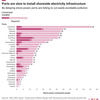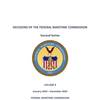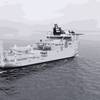Port Security Bill Unanimously Passes Senate
"I am glad the full Senate has acted," Senator Hollings said. "We're saying port security is a priority. We are implementing the 9-11 transportation recommendations, and long-standing concerns I have had regarding the security of our nation's ports. Terrorists are out there, and we need to stay ahead of them."
The bill, the Maritime Transportation Security Act of 2004, was first introduced last April even before the Commission's Report was out. Among its major provisions, that were also called for in the 9-11 Report, are:
Federal grants to help ports around the country implement security plans must be awarded based on risk assessment, including taking into account national security priorities, and national economic and strategic defense concerns. The grants, to be administered by the Undersecretary of Border and Transportation Security, will be awarded after review by the U.S. Coast Guard Captain of the Port and regional Maritime Administrator.
A new system for Customs to clear and inspect imported merchandise. It would require un-cleared cargo remaining on a wharf or pier for an excessive period of time to be removed to a general order warehouse, where it would be inspected to determine its contents. The Secretary of Homeland Security has the discretion to impose a penalty for each bill of lading for cargo that remained on the wharf or pier. In addition, the bill requires the Secretary of Homeland Security to report on the security of ships and facilities used in the cruise line industry. It also requires the Maritime Administration, in coordination with Federal Law Enforcement Training Center, to establish a curriculum to educate federal and state officials on commercial maritime and intermodal transportation












